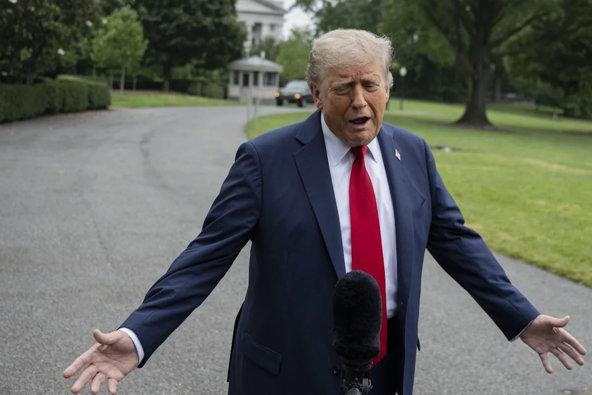
Trump Advances U.S.-Brokered Gaza Ceasefire Plan
Trump advances Gaza ceasefire talks; Israel agrees to U.S.-brokered plan, urges Hamas to accept deal for 60-day truce.
Trump Pushes for Ceasefire as Israel Accepts Deal
President Donald Trump is intensifying diplomatic efforts to secure a ceasefire between Israel and Gaza, announcing that Israel has formally agreed to a U.S.-brokered 60-day truce. The president, who will meet with Israeli Prime Minister Benjamin Netanyahu on Monday, told reporters he expects a ceasefire agreement to be reached as early as next week.
"We hope it's going to happen, and we're looking for it to happen sometime next week," Trump said, highlighting the urgency of ending the conflict and bringing home American hostages still held in Gaza. White House press secretary Karoline Leavitt emphasized the administration's dual priorities: ending the violence and ensuring the safe release of all hostages, many of whom have already returned home through U.S. efforts.
The upcoming White House meeting with Netanyahu follows direct talks between Israeli and American representatives. Special Envoy Steve Witkoff, who has been central in negotiations, is set to travel to Cairo for further discussions. Trump noted that Qatar and Egypt will deliver the final terms of the ceasefire proposal to Hamas, stating, "I hope, for the good of the Middle East, that Hamas takes this Deal, because it will not get better — IT WILL ONLY GET WORSE."
Plan Faces Crucial Test as Hamas Weighs Response
Israeli Minister of Foreign Affairs Gideon Sa'ar confirmed Israel's readiness to finalize the 60-day ceasefire, citing the government's willingness to reach a comprehensive hostage deal. However, previous proposals were rejected by Hamas, largely over issues of a permanent ceasefire and withdrawal of Israeli forces from Gaza.
The Trump administration's plan envisions an end to hostilities in Gaza and the establishment of conditions for broader peace in the Middle East. The president’s team views a Gaza ceasefire as essential to expanding the Abraham Accords, a framework that has normalized Israeli relations with several Arab nations. Sa’ar expressed hope that countries such as Syria and Lebanon might eventually join the peace process, provided Israel’s core security interests are protected.
The ceasefire proposal marks a turning point after weeks of tension, including recent failed truces between Israel and Iran. Trump previously expressed disappointment with both parties after accusations of violations on each side. Now, the administration seeks to reset the peace process, emphasizing cooperation among regional mediators and the urgent humanitarian need to end the violence.
Regional Diplomacy and the Future of Peace Efforts
The proposal’s success hinges on Hamas’s response, with Qatari and Egyptian diplomats delivering the final deal. If agreed, the 60-day truce could lay the foundation for a broader, more lasting peace and pave the way for further normalization agreements under the Abraham Accords. Trump’s diplomatic push comes at a critical moment, as leaders on all sides acknowledge the high cost of ongoing conflict and the need for new paths to stability.
As negotiations continue, all eyes remain on the region. The outcome will determine not only the fate of hostages and civilians in Gaza and Israel but also the trajectory of Middle East diplomacy for years to come.






